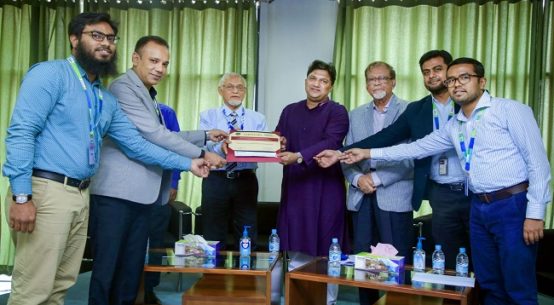
The government is giving priority in ICT, digital technology and research as it seeks to modernize the country’s education system and get optimum output, according to an official document.
The Innovation Team of the Department of Secondary and Higher Education is working to ensure maximum utilisation of ICT and digital technology in education management and education activities, according to the document obtained by UNB.
It said that in the last FY2021-2022 as many as 16,420 teachers were given training on ICT.
“In FY2022-23 a total of 16,300 ICT teachers will be trained in IT,” the document stated.
In addition, more than 62,000 contents have already been uploaded to the Teachers’ Portal with the aim of expanding the quality teaching activities, through which the teachers themselves can contribute to improving the content quality.
Sufferings of stakeholders concerned have been mitigated by ensuring online services for admission, registration, change of institution, publication of test results.
Correction of mistakes in certificates, renewal of recognition, and nomination of representatives are also being done online.
From the FY2018-2019, applications for special grants for educational institutions, teachers and students are being accepted online and money is being distributed through mobile banking.
The document said that implementation of the project titled ‘The Expansion of Science Education Opportunities in Government Colleges’ has begun to build 2,607 classrooms including multimedia classrooms, 200 language-cum-ICT labs, 1,000 science labs, 46 furnished hostels, – office equipment and ICT equipment in 200 government colleges across the country.
Once completed, the project will facilitate the admission of additional two lakh students.
The implementation of another project titled ‘Development of Government Secondary Schools’ that aims to enhance capacity development and quality improvement of education of 323 government secondary schools across the country by constructing new academic buildings and providing up-to-date expansion of multimedia classrooms and necessary equipment, books, sports equipment, scientific equipment, furniture and office equipment has also been initiated.
Once the project is implemented fully, opportunities of admission for further 3.29 lakh students will be opened up.
Three projects are underway for establishing Bangabandhu Sheikh Mujibur Rahman Aviation and Aerospace University, conducting a feasibility study of Bangamata Sheikh Fazilatunnesa Mujib University of Science and Technology and setting up Khulna Agricultural University.
In addition, 43 projects are being implemented for further development of various public universities.
In the last 2021-2022 fiscal, the document mentioned that the National Science and Technology (NST) Fellowship grant amounting to Tk.137.76 crore to 22,220 students and researchers and grants amounting to Tk. 189.10 crore to 6,362 research projects for cultivating science and for research and technology innovation have been awarded.
As part of the initiative for promoting research in medical education, the Institute of Nuclear Medicine and Allied Sciences (INMAS) at the campuses of the Shaheed Suhrawardy Medical College Hospital, National Chest Disease Institute and Hospital of Mohakhali, and Medical College Hospitals of Mohakhali, Pabna, Kushtia, Jessore, Cox’s Bazar, Gopalganj, and Satkhira and the Institute of Nuclear Medicine and Allied Sciences (INMAS) at Mymensingh and Pet-CT scans with cyclotron facilities at INMP, Savar are going to be set-up.


